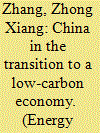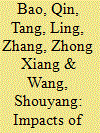|
|
|
Sort Order |
|
|
|
Items / Page
|
|
|
|
|
|
|
| Srl | Item |
| 1 |
ID:
099256


|
|
|
|
|
| Publication |
2010.
|
| Summary/Abstract |
China, from its own perspective cannot afford to and, from an international perspective, is not allowed to continue on the conventional path of encouraging economic growth at the expense of the environment. Instead, China needs to transform its economy to effectively address concern about a range of environmental problems from burning fossil fuels and steeply rising oil import and international pressure on it to exhibit greater ambition in fighting global climate change. This paper first discusses China's own efforts towards energy saving and pollutants cutting, the widespread use of renewable energy and participation in clean development mechanism, and puts carbon reductions of China's unilateral actions into perspective. Given that that transition to a low carbon economy cannot take place overnight, the paper then discusses China's policies on promoting the use of clean coal technologies and nuclear power. Based on these discussions, the paper provides some recommendations on issues related to energy conservation and pollution control, wind power, nuclear power and clean coal technologies and articulates a roadmap for China regarding its climate commitments to 2050.
|
|
|
|
|
|
|
|
|
|
|
|
|
|
|
|
| 2 |
ID:
119207


|
|
|
|
|
| Publication |
2013.
|
| Summary/Abstract |
Carbon-based border tax adjustments (BTAs) have recently been proposed by some OECD (Organization for Economic Co-operation and Development) countries to level the carbon playing field and target major emerging economies. This paper applies a multi-sector dynamic, computable general equilibrium (CGE) model to estimate the impacts of the BTAs implemented by the US and EU on China's sectoral carbon emissions. The results indicate that BTAs will decrease export prices and transmit the effects to the whole economy, affecting sectoral output and demand from both the supply side and demand side. On the supply side, sectors might move away from exporting towards the domestic market, thereby increasing sectoral supply, while on the demand side, the domestic income may be strikingly cut down due to the decrease in export price, decreasing sectoral demand. Furthermore, such shrinkage of demand may similarly reduce energy prices, which would lead to an energy substitution effect and somewhat stimulate carbon emissions. Depending on the relative strength of the output-demand effect and energy substitution effect, sectoral carbon emissions and energy demands will vary across sectors, with increases, decreases or shifts in different directions. These results suggest that an incentive mechanism to encourage the widespread use of environment-friendly fuels and technologies will be more effective than BTAs.
|
|
|
|
|
|
|
|
|
|
|
|
|
|
|
|
|
|
|
|
|